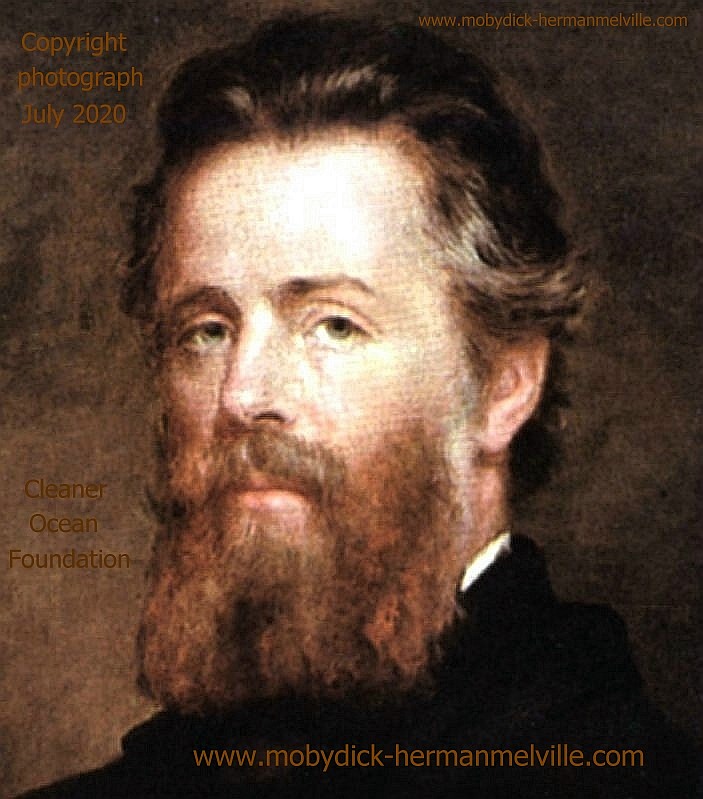
Thomas
Nickerson
Thomas Gibson Nickerson (March 20, 1805 – February 7, 1883) was an American sailor and author. In 1819, when he was fourteen years old, Nickerson served as cabin boy on the whaleship Essex. On this voyage, the ship was sunk by a whale it was pursuing, and the crew spent three months at sea before the survivors were rescued. In 1876 he wrote The Loss of the Ship "Essex," an account of the ordeal and of his subsequent experiences at sea. The manuscript was lost until 1960, and was first published in 1984.
Nickerson was born in Harwich, Massachusetts, the son of Rebecca (Gibson) and Thomas Nickerson. Nickerson made his first sea voyage in 1819, at the age of fourteen, on the ill-fated whaler Essex, which sailed from Nantucket Harbor. A whale rammed and sank Essex on 20 November 1820. The first mate,
Owen Chase, later wrote about the incident in the Narrative of the Most Extraordinary and Distressing Shipwreck of the Whale-Ship Essex, a book that inspired
Herman Melville to write
Moby-Dick.
The
interview of Nickerson by Herman Melville, by way of research for
Moby-Dick, is the subject of a film made in 2015 called In
the Heart of the Sea, starring Chris Hemsworth.
Nickerson returned to sea after his rescue, serving on other whale ships and eventually working his way up to captain of a merchant vessel. Upon retiring he ran a boarding house in Nantucket, which was visited by the writer Leon Lewis, who encouraged him to write down his story of the three months he was lost at sea with the Essex survivors. Nickerson did this, and in 1876, he sent an 80-page manuscript, as well as accounts of other adventures he had later in life, to Lewis for editing. Lewis, however, was having a personal crisis and the manuscript was abandoned.
When Lewis journeyed to England, he left a trunk in the care of Rhea Ogden, a neighbor at his summer cottage on Lake Keuka, near Penn Yan, New York. The trunk containing the manuscript was later given by Ogden to her nephew, James M. Finch, Jr. of Hamden, Connecticut. Nickerson died in 1883, seven years after sending his manuscript to Lewis. The trunk's contents were finally inspected in 1960 and The Loss of the Ship "Essex" Sunk by a Whale and the Ordeal of the Crew in Open Boats was discovered. Finch's wife Ann, recognizing the manuscript's importance, contacted the Nantucket Historical Association.
It took another twenty years before it was authenticated by Edouard A. Stackpole, a Nantucket whaling historian. The Finches donated the manuscript to the Association, who published an abridged version in 1984, a century after Nickerson's death.
IN THE MOVIES
Nickerson's historical character was dramatized in three films:
A 2001 dramatized documentary, entitled Revenge of the Whale, was produced and broadcast on 7 September 2001 by NBC, in which Thomas Nickerson was voiced by actor Jeffrey Carlson.
In 2013, the television movie The Whale was broadcast on BBC One on 22 December, wherein an elderly Thomas Nickerson recounted the events of Essex. The elder Nickerson was played by Martin Sheen, and the younger Nickerson by Charles Furness.
In 2015, the theatrical film In the Heart of the Sea was released, directed by Ron Howard. The older Thomas Nickerson is portrayed by Brendan Gleeson and the young Nickerson is played by Tom Holland.
BOOKS
The 1851 novel,
Moby Dick
or, The Whale by Herman
Melville, which has been adapted several times for film, theatre and radio.
In the Heart of the Sea: The Tragedy of the Whaleship Essex by Nathaniel Philbrick (2000) - partly based on Nickerson's account.

There
are no pictures of the Ann
Alexander sinking in 1851, but this drawing by Thomas Nickerson
gives us an idea of what it must have been like for the sailors
abandoning the sinking ship.

Herman
Melville was the author of a story about what we'd now consider an illegal activity,
the commercial hunting of whales for oil and meat. Whaling is still
carried out by Japan, Iceland and Canada, among other nations, though
most nations voluntarily abstain in the interests of conserving the
magnificent animals - as per International
Whaling Commission guidelines.
Please use our
A-Z INDEX to
navigate this site


